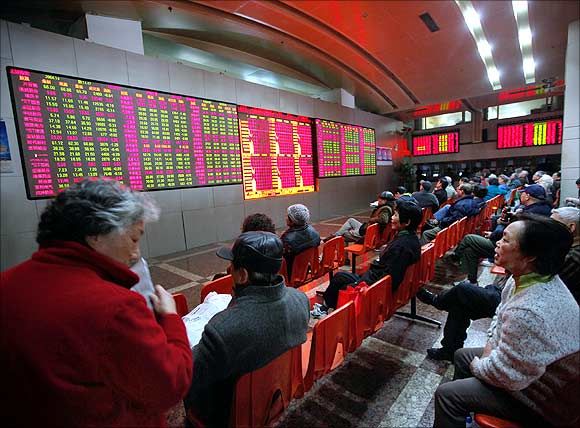The plunge in China's previously booming stock markets has created a major headache for President Xi Jinping
 Chinese stocks rose strongly for a second day on Friday, buoyed by a barrage of government support measures, but worries persist about the long-term impact that four weeks of stock market turmoil may have on the world's second-largest economy.
Chinese stocks rose strongly for a second day on Friday, buoyed by a barrage of government support measures, but worries persist about the long-term impact that four weeks of stock market turmoil may have on the world's second-largest economy.
Over the past two weeks Chinese authorities have cut interest rates, suspended initial public offerings, relaxed margin lending and collateral rules and enlisted brokerages to buy stocks, backed by cash from the central bank.
Some analysts predict further moves to come from the central bank, which often makes policy announcements over the weekend, such as another rate cut or relaxation of the amount of cash banks must hold as reserves.
The frantic efforts to stem the market slide finally began to gain traction on Thursday, when shares rose around 6 percent after the securities regulator banned shareholders with large stakes in listed firms from selling.
The CSI300 index of the largest listed companies in Shanghai and Shenzhen rose another 5.4 per cent on Friday, while the Shanghai Composite Index closed up 4.5 per cent.
"Chinese investors move in herds," said Samuel Chien, a partner of Shanghai-based hedge fund manager BoomTrend Investment Management Co.
"After panic selling drove the market down to the extreme, prices are now starting to move in the other direction."
RIPPLE EFFECT
At the depths of their slump earlier this week Chinese shares had fallen more than 30 percent from their mid-June peak, and for some global investors China's market turmoil had become a greater concern than the crisis in Greece.
Analysts at Bank of America Merrill Lynch said in a research note that the biggest damage from the market turmoil was likely to be the denting of investors' faith in the ability of Chinese policymakers to manage asset prices smoothly.
The BofA Merrill analysts also expected the ripple effect to eventually hit the real economy and corporate earnings.
"We expect this will likely hurt consumption down the road," the note said. "More critical is a potential distortion to credit flows due to the impairment to financial institutions' balance sheets."
Other economists disagreed that the tumult in the stock market was likely to spill over and affect consumption.
Although China's equity market is dominated by retail investors, Julian Evans-Pritchard at Capital Economics in Singapore said only a relatively small, wealthy portion of the population owned shares.
"Indeed, given that the stock market didn't provide any noticeable boost to spending on the way up, there is no reason to expect it to be a drag on the way down," he wrote.
MALFUNCTIONING MARKET
While Beijing's efforts appear to have put a floor under the stock market for now, it is still far from back to normal.
Around 1,300 of China's listed companies -- nearly half the market -- remained suspended after a scramble by firms earlier in the week to escape the carnage by having trading in their stock halted. About 60 companies resumed trading on Friday.
Many of those that remained trading, meanwhile, were propped up by state-directed buying.
On Friday Shanghai Securities News reported that insurers had brought 112.3 billion yuan ($18.1 billion) of equity since the rout began.
The plunge in China's previously booming stock markets, which had more than doubled in the year to mid-June, has created a major headache for President Xi Jinping and China's top leaders, who are already grappling with slowing growth.
Many investors say China's unprecedented attempts to arrest the slide have undermined its commitment to give markets a "decisive" role in pricing assets.
"They can probably stabilise the market, but it will be a political decision, as they will have to compel government, state agencies, banks, pension funds, insurance companies to buy," said Ashok Shah, investment director at London & Capital.
"Essentially the political decision is: to transfer the potential losses from private investors . . .to the state in some manner."
Additional reporting by Pete Sweeney and Kazunori Takada in Shanghai and Pratima Desai in London
Image: People look at an electronic board at a brokerage house in Shanghai. Photograph: Aly Song/Reuters












 © 2025
© 2025